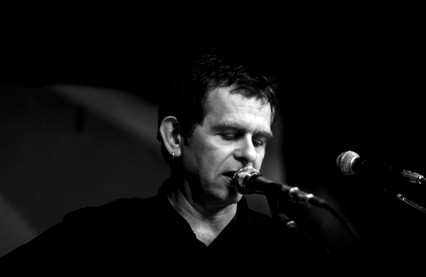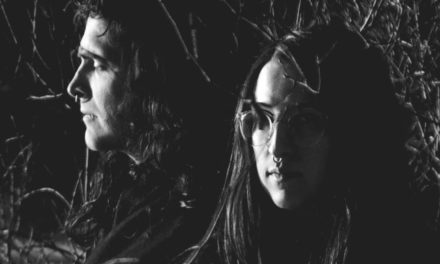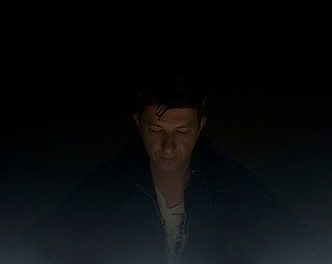“I have little sentiment for my musical past. I only feel sentiment for people.”
Mark Spybey’s contributions to experimental electronic music of all stripes precede him. From his early days with Zoviet France, to his classic records with Download, to his recent work with Phil Western as Beehatch and his underrated albums with Tony D’Oporto as Gnome & Spybey, he’s earned a reputation as a fluid and versatile collaborator. He’s also in the midst of the most productive period of his two decade solo career as Dead Voices On Air, having released seven DVOA LPs (by our count) since 2007. By turns noisy, contemplative, and simply beautiful, DVOA’s discography ranks with the best of any post-industrial musician, and we’re delighted that ID:UD correspondent Kathleen Chausse was able to talk to Spybey about his work.
ID:UD: The debut of your new project Operation Mindwipe will be at the Halloween Industrial Festival. How was this side project formed?
Mark: This isn’t a project of mine, I have been asked to play with an old friend Darryl Hell and chums. I have known Darryl for some time and it’s a real honour to be able to play with him.
ID:UD: You’ve given countless performances with various bands but has anyone else’s performance ever blown you away?
Mark: Many performances have had a profound effect. Seeing Kraftwerk in 1975 for example, Can in the seventies, dozens of punk bands and Swans in something like 1994, where they were symphonic and pin drop quiet. Completely absorbing.
“I suspect labels will be a figment of the imagination in a few years time.”
ID:UD: When looking for a record label, what philosophy do you have?
Mark: I am fortunate, I haven’t really had to look, labels have usually approached me. I want to work with labels nowadays who have an eye on packaging and quality. In the past things were very different but still exciting. I have been very lucky to work with people I admire and like. Of course the industry is changing so rapidly that I suspect labels will be a figment of the imagination in a few years time.
ID:UD: You’ve described Toys R Us as the ultimate DVOA store. What’s your newest toy?
Mark: I guess that quote is a bit dated now. I have always tried to approach music making with the eyes and ears of a child and I don’t feel compelled to use a formula. So anything is used to make music but I suspect I have become more traditional in a sense that I tend to use conventional instruments more. I’m not a purist. Everything is game.
ID:UD: There are a lot of Download fan sites. How do feel about this?
Mark: As much as I feel genuinely flattered that people talk about my contribution to Download and I am proud of the the music we made together as friends, I don’t seek out the opportunity to hear what people say about it anymore because for me, it is not strictly an active regular pursuit. It’s occasional. When we play live together it’s fun and I believe we have an intuitive, natural way of working. I think we all worked hard to achieve that. We put in the miles so to speak. It never felt chaotic, always quite reasoned and real. cEvin and Phil are special.
ID:UD: The Eyes of Stanley Pain was the closest you’ve gotten to a concept album, have you thought of exploring the idea of a concept album again?
Mark: Well, I don’t think it’s a concept album, it was just different because of the circumstances in which it was recorded. We didn’t set out to do a concept album. If I said that at the time, I was likely fibbing. I did a mild concept album a while ago, using feelings to stimulate a work about the women who were active in the German Red Army Faction, called The Silent Wing. I don’t think it was a literal attempt to create a concept album. It’s not articulating events or memories. My last DVOA album had very loose themes too but tangential to say the least.
ID:UD: You’ve explored a lot different styles over your career. Is there a period that stands out for you?
Mark: Now. I have little sentiment for my musical past. I only feel sentiment for people. As soon as I finish a record I rarely listen to it but the past few DVOA records have been special to me because of those who have contributed to them. Creates a kind of collective identity that makes me more able to listen to them with objectivity. I suspect I could have said the same thing at any point in my journey.
ID:UD: You have a vast selection of influences and musical tastes. Is there a style of music everyone should include in their collection?
Mark: I have an eclectic taste. My only sense is this: don’t overlook or ignore because of the fact that you feel attracted to one genre. I think this is dangerous and leads to people making myopic music.
“Active listening is at the heart of successful collaboration.”
ID:UD: In the past you worked on albums by sending cassettes out in the mail. How has your approach changed over the years?
Mark: I send files out now. It’s much easier and quicker. There is so much tosh written about the act of creativity. Sharing files is as creative a process as getting together with people in a studio: probably more so, because so much time in a studio is wasted. File sharing is liberating the act of making music and studios are often dead creative spaces to me. I’ve seen great music being assembled on a laptop on a train, not by me you understand. I need silence, I need my own space and I have to work to create fertile ground. I genuinely like improvising with friends, but I have to feel something in common with them and I never, ever jam. That is such a redundant, lazy word. Active listening is at the heart of successful collaboration.
ID:UD: You’ve always done the artwork and special packaging design of each of your albums, what’s the importance of that part of the release to you?
Mark: Well, actually I haven’t! I have done most of the art but from time to time I get bored by my work and have been lucky to work with a number of friends who have done art for me. It’s just an extension of how I prefer to work. I want to take risks and by creating bridges with those whose art I admire, I think it adds an ingredient that I can’t provide. So Paul Bilger, David Babbitt, Mark Pilon, Marco Roberti, Mary Cassidy and others have helped me and it feels so much better for working with them. Really helps to create a distance for me between the total of my effort and the product. I like to feel as though I am looking at someone else’s work. Helps me to appreciate what it is and not just look at it, feel it and say to myself, “Ugh, I could have done so much better if only…”
ID:UD: There’s a mention on your website of a DVOA Box set in the works, what do you plan to include in it?
Mark: It’s a box to contain all of the collected 7 inch singles that we are releasing on Tourette Records, collaborations with a wide variety of artists to celebrate the 20th anniversary of DVOA.







Trackbacks/Pingbacks